|
For more than 30 years communities of all sizes have used the Civic Index to measure their civic capital – the formal and informal relationships, networks and capacities that enable communities to solve problems and thrive.
Building on decades of work in communities, the fourth edition updates the Civic Index with a specific focus on equity and engagement; key components for healthy, thriving communities. Use the Civic Index with gatherings of community members, partner organizations or staff to spark conversation about community strengths and areas in need of improvement. Resource Link: www.nationalcivicleague.org/resources/civicindex/
0 Comments
 A Conversation Café is a 90-minute hosted conversation which is held in a public setting like a coffee shop, bookstore or library, where anyone is welcome to join. Its simple format helps people feel at ease and gives everyone who wants to a chance to speak. The CC method was created by Vicki Robin, Susan Partnow and Habib Rose. During the summer of 2001, Habib, a natural networker, invited Vicki Robin and Susan Partnow to experiment with organizing neighborhood gatherings of “Cultural Creatives” in Seattle. The Cultural Creatives: How 50 Million People Are Changing the World is a nonfiction social sciences and sociology book by sociologist Paul H. Ray and psychologist Sherry Ruth Anderson. The three Seattleites were set to launch Conversation Cafés in September 2001, but changed gears after the 9-11 terror attacks took place. They immediately began hosting CCs to help people process their emotions and thoughts on what had and was happening in the country. Posted by NCDD Community | March 27th, 2019
The following meeting facilitation tips were submitted by John Godec of The Participation Company. As public sector consultants, The Participation Company helps government agencies manage public issues to accomplish agency objectives. Their private sector business clients are able to maintain or improve their relationships with the public and gain support for their projects. Facilitating meetings can be both an art and a science when the issues being discussed are comparably complex. Getting the right people involved in the discussion from the start can go a long way in your being able to facilitate successfully. Inviting those “right” people is key to reaching consensus. But how to craft an effective invitation is not always a skill everyone has. Here are some meeting facilitation tips to help when creating meeting invitations: Posted by D&D Resources | December 24th, 2009
Dialogue and deliberation are dynamic processes which can be empathy-enhancing, relationship-changing, problem-solving, action-planning, organization-developing, community-building, conflict-resolving, skill developing, prejudice reducing, consciousness-raising, and more! The various models and methods that are used in our field often emphasize, strive for and obtain different outcomes. This resource shares some great quotes from over a dozen leaders in the D&D community about what “dialogue” means to them. Also see our list of leaders’ definitions of deliberation. How do people in the field describe dialogue?‘Dialogue is shared exploration towards greater understanding, connection, or possibility.’
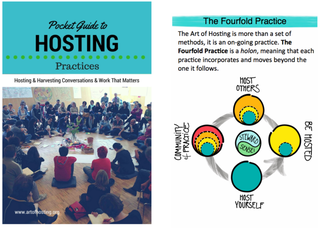 Story Artist Mary Alice Arthur and graphic facilitator Viola Clark collaborated in 2016 to create the first in their Zine series – a POCKET GUIDE TO HOSTING. One side features the Art of Hosting practices, the other side features the AoH methods. Here is a little snapshot of a couple of pages of the zine. (A zine is a self-published work of original or appropriated texts and images, usually reproduced via photocopier.) Art of Hosting will be using the Zine in the upcoming trainings in Innsbruck, Austria and Denmark. Next in the series will be Harvesting. Mary Alice advises: “It is set up as an A4 (if you are not on the A4 system, shrink to fit the space) — follow the instructions for folding (and unleash your inner creative geek!).” Resource Link: AoH Hosting Zine Here are some sets of principles we collected to help inform the creation of the Core Principles for Public Engagement (2009)…
Effective Deliberative Public Engagement: Nine Principles (from the National Consumer Council & Involve.org) 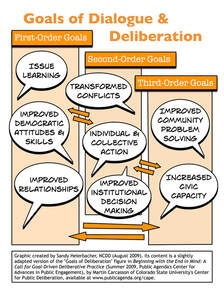 Created by NCDD co-founder Sandy Heierbacher in collaboration with Martin Carcasson, Will Friedman and Alison Kadlec (and based on Carcasson’s paper Beginning With the End in Mind), the Goals of Dialogue & Deliberation graphic pictured here outlines 3 types of goals for public problem-solving work. In a nutshell, the three tiers of goals are individual and knowledge-based goals, immediate group/community outcomes, and longer-term capacity building and community change. Click on the image to view a larger version of the graphic. In a summer 2009 occasional paper published by Public Agenda‘s Center for Advances in Public Engagement (CAPE), NCDD member Martin Carcasson of Colorado State University’s Center for Public Deliberation outlines three broad categories of goals for deliberation. The essay explores how a clearer understanding of the goals and purposes we are trying to achieve through public engagement can sharpen our methods and increase our impacts. It offers a practical framework to help practitioners systematically consider both their short-term and long-term goals and the strategies that will set them up for success. Carcasson’s paper is titled Beginning with the End in Mind: A Call for Goal-Driven Deliberative Practice (Summer 2009), and can be downloaded for free at this link. NCDD’s Co-founder, Sandy Heierbacher, was deeply impressed by the paper and Carcasson’s brilliantly simple “Goals of Deliberation” framework. Carcasson points out that although “first-order goals” like issue learning and improved democratic attitudes are often discounted as we focus on our primary goals related to concrete action and impact on policy, those first-order goals still impact the big-picture goal of increasing a community’s civic capacity and ability to solve problems. In July 2009, Heierbacher spoke to Carcasson about expanding his “Goals of Deliberation” framework slightly so public dialogue for purposes of conflict resolution or conflict management are also emphasized in the framework (he was very interested). In the paper, Carcasson writes about “improved relationships” between individuals and groups as a first-order goal, and mentions that conflict management is another second-level goal… yet his framework figure did not feature those goals. In close communication with Carcasson as well as Will Friedman and Alison Kadlec of Public Agenda, Heierbacher expanded on the framework to create the Goals of Dialogue & Deliberation graphic. View a larger image here. Both the original and the adapted frameworks emphasize improved community problem solving and increased civic capacity as longer-term goals of public engagement work. As we work from project to project, we can lose sight of the fact that our work is contributing to the bigger picture goal of more democratic, effective communities and cultures. In the online dialogue we held at CivicEvolution.org on the “Action & Change” challenge before the 2008 NCDD conference, Joseph McIntyre of the Ag Futures Alliance noted that although public engagement work can lead to numerous types of action outcomes and products, often “D&D is simply plowing the field and planting the seeds that will result in the changes needed. In my case, D&D is part of an evolutionary change.” In his new book, Democracy as Problem Solving: Civic Capacity in Communities Across the Globe (2008: MIT Press), Xavier de Souza Briggs shows how civic capacity—the capacity to create and sustain smart collective action—is crucial for strengthening governance and changing the state of the world in the process. Valuing shorter-term first-order goals and the overall development of civic capacity may be more practical – and satisfying – than solely emphasizing second-order goals like collaborative action and policy change, since such goals usually depend on many decisions and factors outside the scope of any one project. Practitioners should consider all three types of goals when determining project design and when measuring their success. Carcasson’s essay and the Goals of Dialogue & Deliberation framework are helping to create much-needed clarity about the link between public engagement, civic capacity building, and shorter-term goals. It is a great complement to NCDD’s Engagement Streams Framework, which NCDD and its members have used since 2005 to help people decide which engagement methods best fit their goals and resources. At the 2008 NCDD conference, even funders were emphasizing the need for practitioners to (1) own the definition of success and then (2) demonstrate their success. At a breakfast John Esterle and Chris Gates hosted for a cross-section of NCDD leaders to discuss funding challenges and opportunities for this work, Esterle, Executive Director of The Whitman Institute and board chair of Philanthropy for Active Civic Engagement (PACE), implored those present to empower themselves regarding impact. “Let funders know, ‘this is how we measure our success.’” Be proactive and able to articulate your impact in a compelling way. We hope this framework helps practitioners do just that. Resource Link: Goals of Dialogue & Deliberation This article was written by Sandy Heierbacher at the request of Yes! Magazine (and published on August 21, 2009). Sandy also created two abbreviated versions of this article and a one-page ready-to-print flier for public officials, encouraging NCDD members and others to use the resources freely for blog posts, letters to the editor, etc. during and after the contentious August 2009 town halls on health care. All four of these resources are based on insights and tips shared by NCDD members during this controversial time.
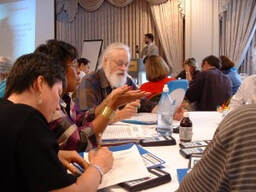 This article was written by Sandy Heierbacher at the request of Yes! Magazine. Sandy also created two abbreviated versions of this article and a one-page ready-to-print flier for public officials, encouraging NCDD members and others to use the resources freely for blog posts, letters to the editor, etc. during and after the contentious August 2009 town halls on health care. All four of these resources are based on insights and tips shared by NCDD members during this controversial time.
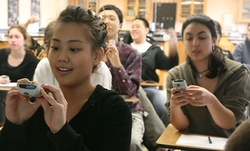 Keypads are audience response devices that look like little calculators or remote controls. They are used in group meetings or events to collect audience responses or opinions, allowing audience members to interact with presentations, give feedback, and become more engaged in large-group settings. Keypads are often used as an added element in large-group deliberation and dialogue events. This resource lists and links to experts in keypad response system as well as mobile device response systems, as recommended by NCDD members in April 2010. This resource was updated in 2021 to remove tools no longer available for use. 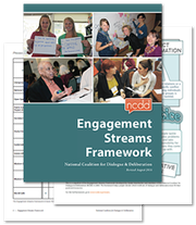 Did you ever wonder how Citizens Juries are different from Deliberative Polling? When should you use World Café, rather than Open Space? Or are Charrettes what's called for? First developed in 2005, NCDD’s Engagement Streams Framework (web version) helps people navigate the range of dialogue and deliberation approaches available to them, and make design choices that best fit their circumstance and resources. No method works in all situations, yet too often people become overly attached to the first D&D process they learn about -- and end up with less-than-satisfying results. Although it was designed for beginners to these processes, the tool also helps more seasoned practitioners understand where their own experience resides on the continuum, and which methods they may want to learn more about depending on the needs of their communities or clients. The framework presents two charts:
The full 8-page Engagement Streams Framework (.pdf) should be printed in color on 8.5 x 11 paper, front-and-back (so the charts line up across two pages). Download the print version of the doc. Last updated August 2014.
Here are a few ways people are using the framework:“The Engagement Streams Framework is a critical tool for us at the CPD as we initially evaluate potential projects for deliberative ripeness, and then again when we get down to process design. It succinctly introduces and organizes the diverse world of D&D in a very practical way. It’s simple enough for beginners to not get overwhelmed, but rich enough for more experienced practitioners to return to again and again.”
-Martín Carcasson, Colorado State University Center for Public Deliberation “I’ve found NCDD’s Engagement Streams Framework to be a very valuable tool when conducting workshops with local government staff and officials on how to improve public engagement practices. It not only helps give the big picture of what methods make sense to use when, but provides enough detail so that people can begin thinking about how they could apply these methods in their local engagement efforts.” -Diane Miller, Civic Collaboration “I love the Engagement Streams as a jumping off point to understanding what features you need in a deliberative process. It’s one of the best breakdowns I’ve seen for explaining the progression of complexity in implementation of the deliberative process. I trust NCDD, which is regularly looking at ALL the methods in play, to do a sound analysis as opposed to people who might be seated in a particular practice or approach. This kind of logical analysis from the community itself is invaluable for technologists to build applications that effectively support dialogue and deliberation.” - Ele Munjeli, Web Developer “When I was working on my report on the civic engagement landscape in Chicago, I had no idea how to organize the thousands of diverse pieces of information I’d collected into a coherent narrative. As I thought through options, the information naturally seemed to cluster into four areas, strikingly reminiscent of the four NCDD Engagement Streams. At first, I hesitated using that framework, designed to categorize methods, to segment a city’s organizations and projects. Surprisingly though, it has proven the single most valuable tool in helping Chicagoans understand the local D&D field.” - Janice Thomson, Stakeholder Engagement Consultant “I use the framework in both leadership training and traditional teaching environments. I found it very helpful for adults taking leadership courses who often had little experience with dialogue, as the framework helped them “get it” and differentiates dialogue from other processes. It also quickly gave them several models of dialogue, so they understood that there are many ways to approach it. With professors and students who are engaged in “Difficult Dialogues” classes at UT Austin, focusing on challenging topics such as immigration, science and religion, and HIV, the framework helps them understand what I mean when I say “Dialogue is NOT your usual classroom discussion” and gives them a useful context for learning how to talk about these controversial topics in a meaningful and productive way.” - Juli Fellows, Organizational Consultant and Trainer “We built the Streams of Engagement framework into our online Issue Guide Exchange. When someone uploads a guide to the tool we give them the option of identifying which streams of practice the guide addresses. Then, when someone is searching for guides, the streams of practice provide them with another way to figure out which guides will best meet their needs.” - Carrie Boron, formerly of Everyday Democracy “I just discovered the framework and am using it in a group facilitation workshop I’m teaching to AmeriCorps interns. My intent is to get them to think about what type of facilitation they are attempting and what outcomes they are looking for, and then look at what methods make the most sense, given the desired outcomes.” - Marty Jacobs, Systems In Sync “I’ve used the engagement streams cartoon mostly, since it’s a great tool for introducing people to the ideas of different uses for the methods. I’ve used it and prepared it for Carolyn [Lukensmeyer] to use at presentations for United Way leadership, state elected officials, and college classrooms.” - Susanna Haas Lyons, formerly of AmericaSpeaks Web Version (373KB) Print Version (3.5 MB) We also recommend you download NCDD's Resource Guide on Public Engagement which features the engagement streams in full. Collaborative Governance in Local Government: Choosing Practice Models and Assessing Experience12/24/2008 This workshop at NCDD’s 2006 conference addressed how civic engagement practitioners can assist local governments in thinking systematically about and choosing among the various forms of civic engagement in public decision-making, and here is where you can find all five handouts/presentations that from this popular session.
In the workshop, Terry Amsler presented a forthcoming Collaborative Governance Initiative publication on Strategic Civic Engagement addressing important questions for local government officials to consider in selecting, designing, implementing, and sustaining civic engagement processes. Beyond the Vocal Few: Ideas To Encourage Broader Public Participation In Your Community This 2-page document offers suggestions for achieving better representation in public involvement and civic engagement efforts that were compiled by the Institute for Local Government’s Collaborative Governance Initiative. Ten Public Involvement “Hot Spots” While most public involvement strategies offer positive results for all, some efforts are not as effective as sponsors and participants would like. Outlined in this two-page document from the Institute for Local Government are a few of the ‘hot spots’ where extra attention may mean the difference between success and failure. Lisa Blomgren Bingham presented a research paper examining the work of AmericaSpeaks in three cities – Cincinnati, Chicago, and Charlotte. In interviews with local and regional government officials, researchers examined questions of entry and contracting, impact of the process on public policy, and sustainability or institutionalization of civic engagement processes. Assessing Deliberation: Setting the Agenda, Implementing Policy, and Outcomes This 33-page research report presented at NCDD’s 2006 conference examines AmericaSpeaks’ 21st Century Town Meeting – one important model for facilitating citizen participation through large scale (100-5,000) dialogue in which citizens come together, listen to each other in a public arena, and make decisions as a collective community. Many researchers ask why there is a gap between scholarship and practice in the field of deliberation; this study responds to the call for empirical testing by examining the AmericaSpeaks model of a 21st Town Meeting. Specifically, this study examines agenda setting, implementation, and outcomes in the context of three different cities where the Town Hall Meetings occurred. You can also download the 20-slide PowerPoint presentation used to introduce this research project. Malka Kopell presented Community Focus’s report on participatory budgeting in Menlo Park, Your City/Your Decision: Phase II Report on Community Workshop Results, describing a year-long process to involve the community in decisions about a sustainable funding strategy for city-provided services. Your City/Your Decision: Citizen-Based Budgeting in Menlo Park, CA 5-page PowerPoint document created by Malka Kopell.  Here are the five great handouts from “The Wisdom Council: A Tool for Empowering 'We the People'” – facilitated by Jim Rough and Deanna Martin at the 2006 NCDD Conference in San Francisco. Here is the full workshop description: Imagine all of citizens in your community talking together creatively and collaboratively about the big, important issues. Convening this kind of conversation holds the promise of raising our collective intelligence, consciousness and wisdom on issues like healthcare, traffic, our educational system, and violence. The Wisdom Council is a new democratic tool that promises a grassroots way to develop near-unanimous strategies and the will to implement them on the issues that matter to you and your neighbors. It offers the prospect of engaging all in one, heartfelt, creative conversation that is ongoing, moving people beyond partisanship to serving the public interest. There have been a number of successful experiments with the "Wisdom Council" in cities, schools, among homeless people and in various organizations. Come hear about the growing number of experiments that demonstrate this new process really works – like in the Department of Agriculture of Washington State, at Salmon Bay Elementary School in Seattle, and at a local food co-op. Join us for an introduction to the process and learn how you might implement a Wisdom Council in your community. The Handouts:
(2006) |
Categories
All
|
Follow Us
ABOUT NCDD
NCDD is a community and coalition of individuals and organizations who bring people together to discuss, decide and collaborate on today's toughest issues.
© The National Coalition For Dialogue And Deliberation, Inc. All rights reserved.
© The National Coalition For Dialogue And Deliberation, Inc. All rights reserved.


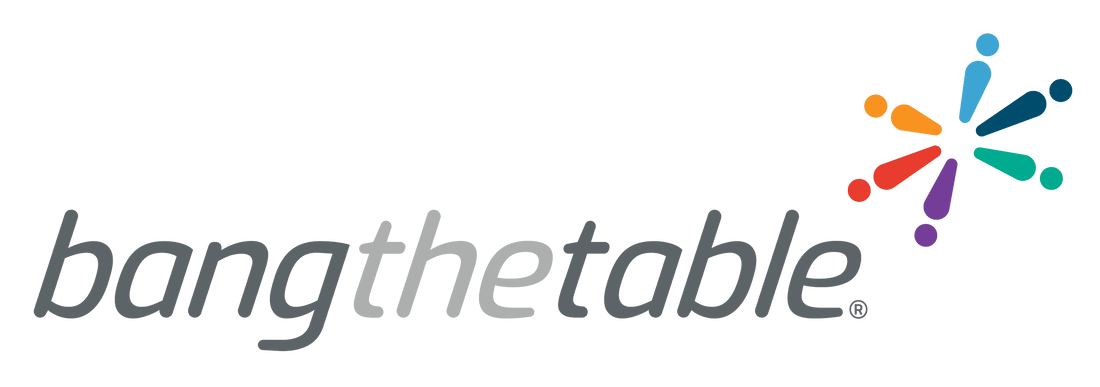
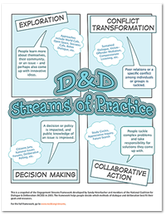
 RSS Feed
RSS Feed